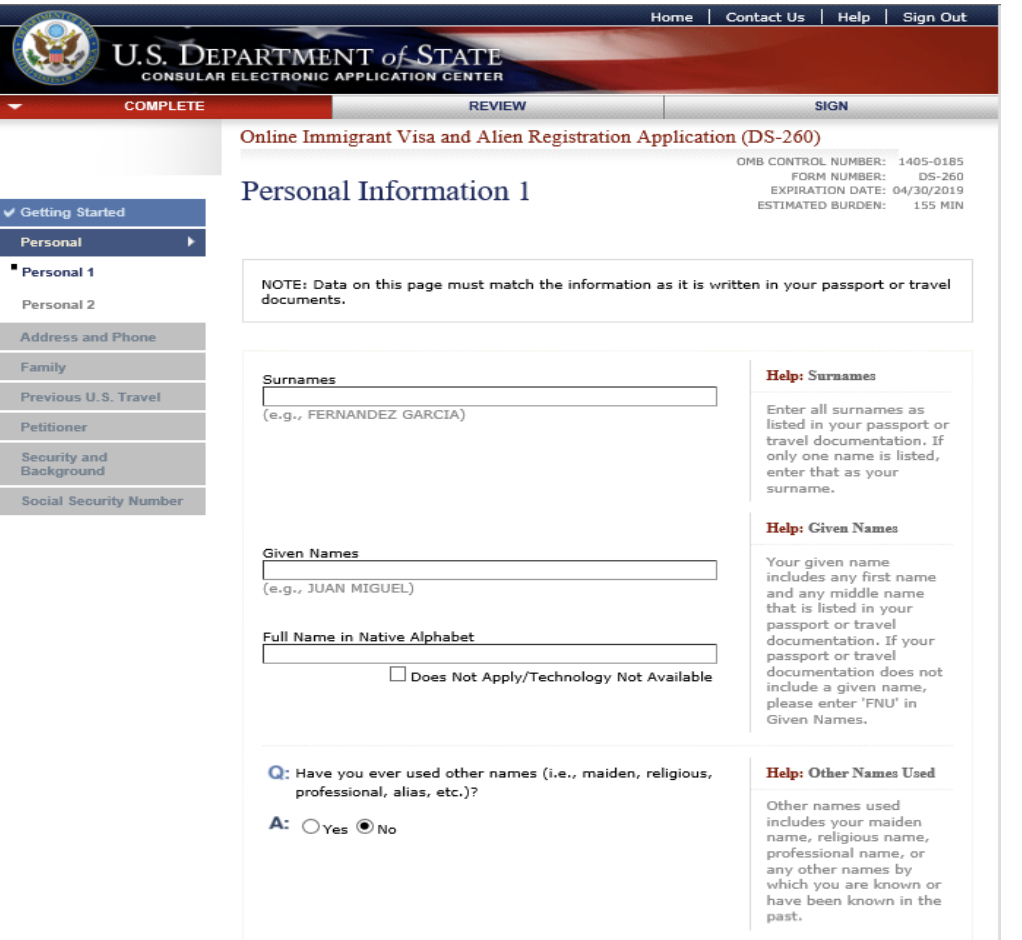Processing Time, Fees & Instructions
Form DS-260, Immigrant Visa Application, is an online form that needs to be filled out by individuals and family members applying for the Diversity Visa as well as anyone who is trying to get a marriage-based green card and living outside of the U.S. On this page, you will learn everything about DS-260, how to file the form, the required documents for different types of applications, the specifics of the green card interview, and answers to the most commonly asked questions.
What is the Form DS-260?
The DS-260, Immigrant Visa Application, is an online form for individuals and family members applying for the Diversity Visa as well as anyone who is trying to get a marriage-based green card and living out of the U.S. Submitting your DS-260 and receiving approval is an integral part of progressing through your consular processing application. Your DS-260 is reviewed by the National Visa Center (NVC) and not the USCIS.
The DS-260 is intended for permanent residents who have the intention of staying in the United States, not just those traveling to the U.S. temporarily for work or pleasure. On the form, you will be asked questions about your background, places you have resided (since 16 years old), educational history, questions about family members, and other important details relating to past life events.
Total Costs of DS-260
DS-260 fee in 2022, which is also known as the USCIS Immigrant Fee, is $220 and is required for USCIS to create and send you your physical green card. As soon as your receive your visa stamp, which you will use to enter into the U.S., it’s important to pay the fee online. USCIS will send the physical green card to the U.S. address you specified roughly three-to-four weeks after entering the United States.
Learn about filing fees for family green cards.
DS-260 Processing Time in 2022
In 2022, it takes between 1 and 2 months for the NVC to process a DS-260 Form. However, your wait time can differ depending on the workload of the system. During the busy season, you should expect to receive an answer for your DS-260 in 2 to 3 months. When considering this wait time in contrast to the family-based green card, which takes between 10 – 17 months, the DS-260 processing time only takes a fraction of the entire process.
Find out more about family-based green card processing times.
How to File DS-260: Checklist
Filing your DS-260 is just one of the steps in your immigration journey. Before you can file for DS-260, you must first get approval on your I-130 and second get approval on your DS-261. This implies paying all of the necessary fees and submitting all of the supporting documents for those two forms. Only after that can you file for DS-260, and below is a checklist for you to keep in mind:
- Make sure that you have your case number handy, beneficiary ID number (the person you are sponsoring), and check your NVC welcome notice for the invoice number.
- You must include information about children in your form if you have children. This includes any biological, step, or adopted children of yours. It is irrelevant how old they are and whether they are coming with you to the U.S. or not – you must mention them in your application.
- Include all of your places of residence since you turned 16 years of age. This should include any official addresses that you lived at and also any unofficial addresses where you resided on a permanent basis.
- The green card will be mailed to you, so it is crucial that you include the most up-to-date physical mailing address on your form. If you provide incorrect information, it won’t be the end of the world, it will just take longer for you to receive your green card.
- After completing your online application, you must read through it and ensure that all of the information is correct. If you are certain that you made no mistakes or omissions, you can click submit.
- Once submitted, make sure to print the confirmation page, as it will be required at the interview.
Unfortunately, if you made a mistake on your DS-260 form, there is no way to fix it, which means that you cannot amend an already submitted form. However, this doesn’t mean that you have to start from the beginning or that your entire immigration process is ruined. You must simply let the U.S. consulate interviewing officer know about the mistake. It is a common practice for consulate officers to correct some application mistakes.
If you want to familiarize yourself with the form, you can consult a DS-260 sample, which will prepare you to fill out your own application. To locate the DS-260 itself, you must access it via the Consular Electronic Application Center (CEAC) by going to the State Department’s website and then clicking on “Submit Visa Application and Civil Documents” or on your respective U.S. embassy or consulate website.
DS-260 & Visa Interview
After you file DS-260, you will have to attend a green card interview appointment. Prior to your interview, you will have to undergo a medical exam and schedule the interview with the NVC at your local U.S. embassy or consulate. After scheduling the interview, you will receive an interview appointment letter from the NVC, which you will have to bring with you to the appointment. In the letter, there will be a list of people who should be present during the interview.
You must bring the following for your interview:
- Your valid passport
- The interview appointment letter
- Two color passport photographs
- Proof of your relationship – such as a marriage certificate
- Medical exam results
- Any other documents listed on the USCIS or consulate website for your green card classification
The U.S. embassy or consulate will decide on the outcome of your interview within a week.
Supporting Documentation for DS-260
Below are the supporting documents required from the applicant’s spouse as well as the sponsoring spouse. You do not need to send the originals, but provide copies of the following:
Applicant’s Spouse Documents
- Evidence of nationality (i.e., copy of a birth certificate, passport photo page)
- Copy of marriage certificate
- Copy of marriage termination documentation if there are past marriages (copies of divorce or death certificates)
- Copy of military record, if applicable
- Copy of police certificates—also known as police clearance letters—demonstrating you have not committed any infractions. These must be obtained from:
- Anywhere you lived in your home country for a minimum of six months after turning 16 years old
- Anywhere you lived outside of your home country where you lived for at least one year after age 16
- Any jurisdiction where you were arrested or committed a crime regardless of how long you lived there or your age
- Evidence proving you can financially support your spouse in the U.S.; Affidavit of Support I-864
- Copy of marriage termination documentation if there are past marriages (copies of divorce or deaths certificates)
- Documentation showing proof of domicile (i.e., copy of a state-issued identification or other proof of address)
After submitting all the appropriate documents, it normally can take a few months to have your visa interview scheduled. Keep an eye out for a notice from the National Visa Center for your assigned interview date and time.
Filing DS-260 for the Diversity Visa Program
If you are filling out the DS-260 for the Diversity Visa Program, then you’ll need to first enter your Diversity Visa case number (found on your selection notice) onto the online DS-260 form. From there, you can access and update any information about yourself and/or your family that you originally submitted in your Diversity Visa entry application.
If there have been changes to the information in between submitting the entry application—like having a child or getting married—you’ll need to make those changes on Form DS-260. Technically, the term “family member” on the form refers to a spouse and/or unmarried children under the age of 21 when you entered the Diversity Visa program. Note that when you add relatives, you’ll need to submit documentation proving the familial relationship as well. Sometimes we’ll see that applicants had a spouse or a child before submitting the Diversity Visa entry, but they did not include them on the form. If that’s your case, then this may make you ineligible.
It’s never wise to lie on immigration documentation because it can ruin your chances of being approved for a visa. After you submit Form DS-260, print the confirmation page and take it with you to your visa interview.
Filing DS-260 for the Marriage-Based Green Card
If you are ready to file Form DS-260 online, then that means your I-130 has been approved, you submitted your DS-261, and you paid the State Department’s application processing fee and financial support form fee. After those payments are processed, you can then go fill out the DS-260.
You will need the following:
- Your Case Number
- Beneficiary ID number
- Invoice number from National Visa Center welcome notice
Fill out the DS-260 in English only. If your name or address has characters that are not available in the Roman alphabet, you need to use the corresponding letters. The National Visa Center, upon receiving your submitted DS-260, will send you a receipt notice. The receipt notice typically arrives the same day you submitted the DS-260. You’ll also need to provide the necessary supporting documentation for your case—either by email, mail, or upload—depending on which consulate is processing your case. Carefully read the notice the NVC sends to you to know which way to submit the required additional documents. As a rule of thumb, do not send them the original if they request them by mail but instead, make copies of the originals and send those. You can bring the originals with you to the U.S. consulate for your green card interview.
DS-260 Frequently Asked Questions
Below you will find answers to the most commonly asked questions about the DS-260.
Can I see a sample DS-260?
You can always see a sample DS-260 at any time during your application process. If you are in the middle of filling out the DS-260 and have to leave the online form to gather information, you can click the ‘Save’ button at the bottom of every page and then return to complete it at a later point.
How long does DS-260 take to process?
The length of processing will depend on many factors, including the wait times and backlog of the NVC, USCIS, and individual service centers amid the pandemic. The first part of the process is to have your I-130 approved by USCIS, and this can take 7–15 months or longer depending on your case.
How can I check my DS-260 status?
You can check your case status by logging into the CEAC website.
Can I answer the questions in my native language?
No, you must answer all required questions in English only. If you submit your application in a different language than English, it will likely get rejected, and you will have to redo the application with your answers in English.
Is it mandatory to complete all the fields?
You can leave the fields marked “optional” blank, but you must complete the rest of the fields. It is wise to have an experienced immigration expert review your paperwork to avoid any mistakes or setbacks in the green card process.
What is the DS-261 for?
This online form asks questions regarding ways to contact you and your current address so that the State Department can communicate with you during the process. This information must be accurate and up-to-date because it will be the information used to contact you directly in your country.
Do I need to bring the DS-260 with me to my interview?
You do not need to bring it because the officer interviewing you will have full access to your application. However, you must make sure that you bring all other required documents that you were told to bring with you to the interview.






